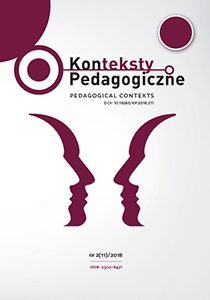Abstract
The contemporary world is overwhelmed by mass media. Without it, it is hard to imagine any sphere of human life. The multimedia also perme-ated to the education, which resulted in the growing popularity of educational platforms. It is caused by technological development and also a tendency to lower the costs of education. Their availability and attractive form, which certainly is supporting the process, are also advantages of this form of studying. The fact that academic teachers and students can communicate with each other in very much the same way as in the traditional way of communication is also essential. Although educational platforms are being more often applied in education, still only a few colleges and universities are using them. This is because there are a mistrust and anxiety about the disappearance of traditional human relations. Educational platforms have many advantages, but they have also some defects. However, in the contemporary world, where modern technologies are dominat-ing, their application seems to be inevitable.
References
Betlej, P. (2009). E-learning w organizacji zajęć i opinii studentów – studium przy-padku. E-mentor, 1, 56–60.
Clarke, A. (2007). E-learning, nauka na odległość, trans. M. Klebanowski. Warszawa: Wydawnictwa Komunikacji i Łączności.
Garnik, I. & Redlarski, K. (2014). Zastosowanie systemów e-learningu w szkolnictwie wyższym. In: B.A. Basińska & I. Garnik (eds.), Zarządzanie informacyjnym środowiskiem prac (p. 77–94), https://depot.ceon.pl/bitstream/handle/123456789/6002/Redlarski_Garnik_Rozdzia%20_4.pdf?sequence=1 [accessed: 1.12.2018].
Jędryczkowski, J. (2008). Prezentacje multimedialne w pracy nauczyciela. Zielona Góra: Oficyna Wydawnicza Uniwersytetu Zielonogórskiego.
Jodłowski, Ł. (2015). Wykorzystanie platformy edukacyjnej Moodle do prowadzenia zdalnych szkoleń bibliotecznych w Bibliotece Uniwersyteckiej we Wrocławiu, http://www.repozy-torium.uni.wroc.pl/Content/71571/12_Lukasz_Jodlowski.pdf [accessed: 1.12.2018].
Klichowski, M. & Marciniak, M. (2013). The Paradox of Commodification of the Body in a Society of Consumption and Cyborgization. Studia Edukacyjne, 29, 153–167.
Komańda, M. (2014). E-learning na uczelniach publicznych i niepublicznych: per-spektywa studentów wybranych kierunków ekonomicznych. E-mentor, 5, 33–38.
Kopciał, P. (2013). Analiza metod e-learningowych stosowanych w kształceniu osób dorosłych. Warszawa: Warszawska Wyższa Szkoła Informatyki.
Marciniak, M. (2018). Studenckie strategie korzystania z mediów – blokada osiągnięć akademickich? Konteksty Pedagogiczne, 1, 157–167.
Molga, A. (2015). Platformy e-learningowe oraz ich znaczenie dla procesu kształcenia. Dydaktyka Informatyki, 10, 133–139.
Plebańska, M. & Kula, I. (2011). E-learning – treści, narzędzia, praktyka. Warszawa: Alamer.Podstawa programowa kształcenia ogólnego. Zadania ogólne szkoły. Dz. U. z 1996 r. Nr 67, poz. 329, z późniejszymi zm.
Strykowski, W. (1996). Media i edukacja. Edukacja Medialna, 1, 4–8.Wedeł-Domaradzka, A. & Raczyńska, A. (2013). Jak skutecznie prowadzić zajęcia na platformie edukacyjnej? Warszawa: Krajowy Ośrodek Wspierania Edukacji Zawo-dowej i Ustawicznej.
Wodecki, A. (2006). Po co e-learning na uczelni? In: M. Dąbrowski & M. Zając (eds.),E-learning w kształceniu akademickim (p. 9–14). Warszawa: Fundacja Promocji i Akredytacji Kierunków Ekonomicznych.
In accordance with the recommendation of the Ministry of Science and Higher Education, which aims to counteract the practice of “ghostwriting” and “guest authorship,” all authors submitting their text for publication should attach an author’s statement which declares the contribution of each of the authors to the article. The printed and signed statement should be delivered by mail or other means to editor-in-chief Joanna Skibska or sent in the form of a scan to the following e-mail address: redakcja@kontekstypedagogczne.pl. The authors will not receive remuneration for publishing their papers. The editors reserve the right to make minor editorial changes to the articles which will not affect the substance of the article. We encourage all authors to prepare their articles in accordance with the guidelines for manuscript preparation. Download pdf file.
Authors transfer all copyrights and grant the journal the right of first publication with the work simultaneously licensed under a Creative Commons Attribution License that allows others to share the work with acknowledgement of the work's authorship and initial publication in this journal. All authors agree to the publishing of their email addresses, affiliations and short bio statements with their articles during the submission process.

